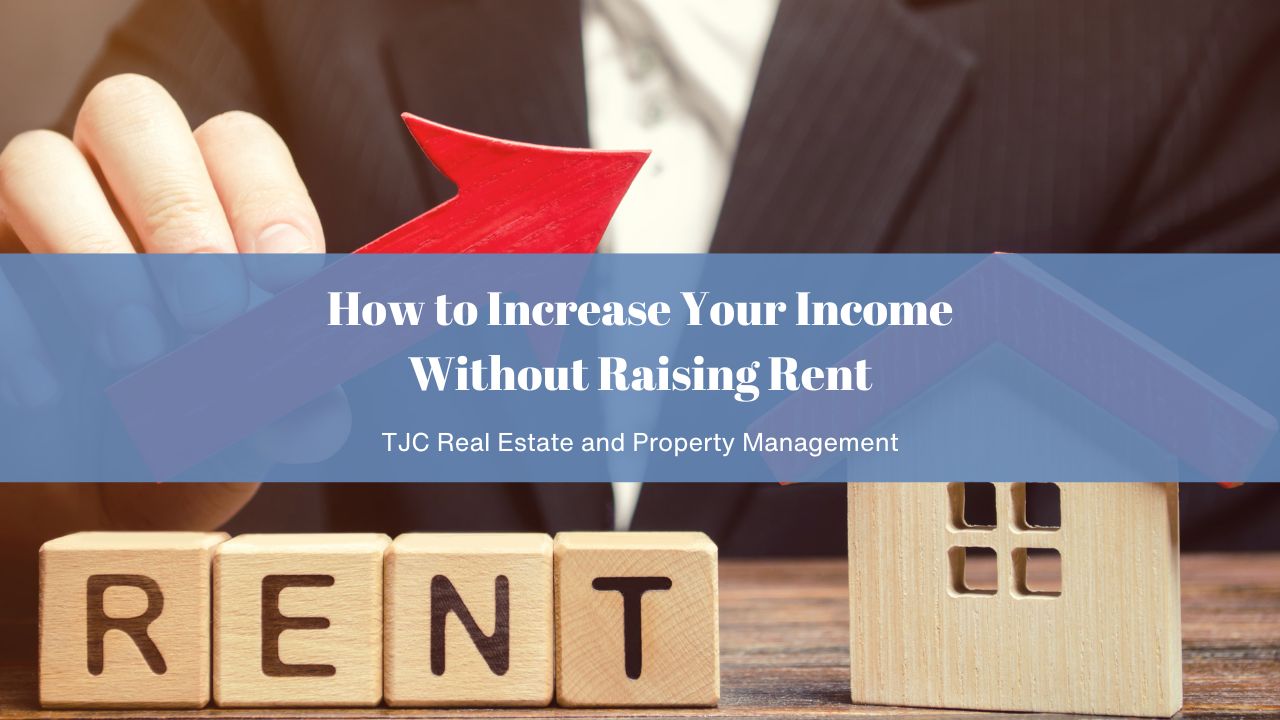
Every investor who purchases real estate and converts it into a rental property does so with the goal of generating income. Achieving financial freedom is often a long-term vision, and owning rental properties can be a step toward that.
However, managing a rental property on your own comes with its own set of challenges. Maximizing earnings while balancing responsibilities can become demanding. A common method many landlords turn to boost income is raising the rent. While this might seem like a straightforward solution, increasing rent comes with potential drawbacks.
We at TJC Real Estate and Management will cover ways to increase income without touching rent prices!
At first glance, increasing rent seems like the easiest way to grow your revenue but there are several potential downsides to this:

Depending on your state or municipality, there may be strict regulations on how much and how often you can increase rent. Raising rent beyond a reasonable threshold may be seen as excessive or even illegal, which can lead to disputes or legal action.
Good tenants pay on time, take care of the property, and follow the lease terms. Raising the rent too much might drive them away, leading to vacancies. You’ll then face the added costs of marketing the unit, cleaning and preparing it, and going through the screening process again.
Even modest rent increases can create financial strain for certain demographics. If your tenants have limited disposable income, they might struggle to keep up with higher rent, resulting in late payments. This disrupts your cash flow and potentially causes friction in the landlord-tenant relationship.
If similar properties nearby are offering more competitive rates, you might find your unit sitting vacant longer than expected. Vacancies result in lost income and can even jeopardize your financial obligations. Fortunately, there are alternative strategies to increase your rental income without necessarily raising the rent.
There are multiple ways to improve your bottom line that depend on your property’s type, location, and amenities. Consider these creative and effective options:

Make it clear in your lease agreement that late rent payments will incur an additional fee. This should be reasonable, legal, and enforced consistently. Doing so encourages timely payments and reinforces the importance of adhering to the payment schedule. Rent is the lifeline of your investment, and ensuring its prompt collection is vital to maintaining cash flow.
Though some Denver landlords are hesitant to permit subletting, doing so with clear guidelines can generate extra revenue. Charging a monthly fee or a percentage of the sublet rent can add up over time. Be sure to include provisions in the lease and meet any subtenants to maintain control over who is living on your property.
Opening your property to pet owners can widen your tenant pool and bring in additional monthly income. Pet rent, usually charged per pet, helps cover potential wear and tear. This fee becomes more impactful if you manage a multi-unit building with several pet-owning tenants.
In busy or urban neighborhoods, parking is a valuable commodity. Charging tenants for a dedicated parking space can provide a steady income stream. Likewise, if your property has extra storage areas such as a basement room, garage, or outdoor shed, consider renting those out as well.
Work with Our Professional Managers!
Not all renters own large or specialized equipment, so offering items like a washer, dryer, lawnmower, or power tools for rent can be mutually beneficial. This setup adds convenience for tenants and creates another source of income for you without raising base rent.

If you’re struggling to find long-term tenants, listing your unit on a short-term rental platform can be a temporary solution. This approach is especially effective if your property is located near tourist attractions or city centers. Short-term rentals can sometimes generate more income than traditional leases, provided they are well-managed and compliant with local regulations.
You can offer tenants optional paid services like housekeeping, landscaping, or laundry pickup. These can be outsourced and included as premium add-ons. Providing these conveniences enhances the tenant experience and can result in higher retention rates and increased profitability.
While raising rent may seem like the simplest way to increase profits, it can also lead to unintended consequences such as tenant turnover, late payments, and vacant units. Instead of relying solely on rental rate hikes, consider incorporating alternative income streams that add value to your property and appeal to tenants.
Being resourceful and offering thoughtful, optional upgrades can help you maintain strong tenant relationships while still increasing your bottom line. At the end of the day, your goal as a landlord is to build a sustainable income source that contributes to long-term financial success.
Looking to boost your rental income without losing great tenants? Discover smart, sustainable strategies with TJC Real Estate and Management. Contact us today to learn how we can help you grow your rental investment the right way!
© 2025 TJC Real Estate. All rights reserved. Privacy Policy | Terms of Use | Portable Tenant Screening & Disclosure | Website by Distill